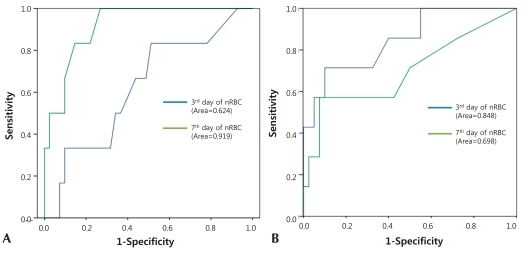1. Buonocore G, Perrone S, Gioia D. Nucleated red blood cell count at birth as an index of perinatal brain damage. Am J Obstet Gynecol 1999;181:1500–1505.


3. Oski FA, Naiman JL. Hematologic Problems in the Newborn. 1982;Philadelphia: WB Saunders Co, :1–31.
4. Anderson GW. Studies on the nucleated red cell count in the chorionic capillaries and the cord blood of various ages of pregnancy. Am J Obstet Gynecol 1941;42:1–14.

5. Ferber A, Fridel Z, Weissmann-Brenner A, Minior VK, Divon MY. Are elevated fetal nucleated red blood cell counts an indirect reflection of enhanced erythropoietin activity. Am J Obstet Gynecol 2004;190:1473–1475.


6. Huch R, Huch A. Maternal and fetal erythropoietin: physiological aspects and clinical significance. Ann Intern Med 1993;25:289–293.
7. Teramo K, Vilho K, Hiilesmaa VK. Amniotic fluid and cord plasma erythropoietin levels in pregnancies complicated by preeclampsia, pregnancy-induced hypertension and chronic hypertension. J Perinat Med 2004;32:240–247.

8. Doi S, Osada H, Seki K, Sekiya S. Relationship of amniotic fluid index and cord blood erythropoietin levels in small for and appropriate for gestational age fetuses. Obstet Gynecol 1999;94:768–772.


9. Baschat AA, Gembruch U, Reiss I, Gortner L, Harman CR. Neonatal nucleated red blood cell count and postpartum complications in growth restricted fetuses. J Perinat Med 2003;31:323–329.

10. Baschat AA, Gungor S, Kush ML, Berg C, Gembruch U, Harman CR. Nucleated red blood cell counts in the first week of life: a critical appraisal of relationships with perinatal outcome in preterm growth-restricted neonates. Am J Obstet Gynecol 2007;197:286.e1–286.e8.


11. Minior VK, Bernstein PS, Divon MY. Nucleated red blood cells in growth-restricted fetuses: associations with short-term neonatal outcome. Fetal Diagn Ther 2000;15:165–169.


13. Baschat AA, Gembruch U, Reiss I, Gortner L, Harman CR. Neonatal nucleated red blood cell count and postpartum complications in growth restricted fetuses. J Perinat Med 2003;31:323–329.

14. Lee HR, Shin S, Yoon JH, Kim BJ, Hwang KR, Kim JJ, et al. Complete blood count reference values of donated cord blood from Korean neonates. Korean J Lab Med 2009;29:179–184.


15. Pranke P, Failace RR, Allebrandt WF, Steibel G, Schmidt F, Nardi NB. Hematologic and immunophenotypic characterization of human umbilical cord blood. Acta Haematol 2001;105:71–76.


16. Rolfo A, Maconi M, Cardaropoli S, Biolcati M, Danise P, Todros T. Nucleated red blood cells in term fetuses: reference values using an automated analyzer. Neonatology 2007;92:205–208.


17. D'Souza SW, Black P, MacFarlane T, Jennison RF. Haematological values in cord blood in relation to fetal hypoxia. Br J Obstet Gynaecol 1981;88:129–132.


18. Dubowitz KMS, Dubowitz V, Goldbergh CG. Clinical assessment of gestational age of the newbonr infant. J Pediatr 1970;77:1–14.


19. Catlin EA, Carpenter MW, Brann BS, Mayfield SR, Shaul PW, Goldstein M, et al. The Apgar score revisited: influence of gestational age. J Pediatr 1986;109:865–868.


20. Low JA, Wood SL, Killen HL, Pater EA, Karchmar EJ. Intrapartum asphyxia in the preterm fetus 2000 grams. Am J Obstet Gynecol 1990;162:378–382.


21. Thorngren-Jerneck K, Herbst A. Low 5-minute apgar score: a population-based register study of 1 million term births. Obstet Gynecol 2001;98:65–70.


22. Casey BM, McIntire DD, Leveno KJ. The continuing value of the apgar score for the assessment of newborn infants. New Engl J Med 2001;344:467–471.


23. Lubchenco LO, Hansman C, Dressler M, Body E. Intrauterine growth as estimated form livebone birth weight data at 24 to 42 weeks of gestation. Pediatrics 1963;32:793–801.

24. Papile LA, Burstein J, Burstein R, Koffler H. Incidence and evolution of subependymal and intraventricular hemorrhage: a study of infants with birth weights less than 1500 gm. J Pediatr 1978;92:529–532.


25. Flynn JT. An international classification of retinopathy of prematurity: clinical experience. Trans Am Ophthalmol Soc 1984;82:218–238.


26. Lippman HS. A morphologic and quantitative study of the blood corpuscles in the new-born period. Am J Dis Child 1924;27:473–526.

27. Song IH, Lee WK, Jung HL, Keum DH. The Significance of nucleated red blood cell counts in low birth weight neonates. J Korean Pediatr Soc 1993;36:1526–1533.
28. Hur SK, Park MS, Namgoong MK, Kim HM, Yang JS, Lim BK, et al. The significance of nucleated red blood cell counts in various conditions associated with acute or chronic perinatal asphyxia. J Korean Pediatr Soc 1992;35:1514–1519.
29. Flod NE, Ackerman BD. Perinatal asphyxia and residual placental blood volume. Acta Paediatr Scand 1971;60:433–436.


30. Yao AC, Wist A, Lind J. The blood volume of the newborn delivered by cesarean section. Acta Paediatr Scand 1967;56:585–592.


31. Georgieff MK, Schmidt RL, Mills MM, Radmer WJ, Widness JA. Fetal iron and cytochrome c status after intrauterine hypoxemia and erythropoietin administration. Am J Physiol 1992;262:R485–R491.


32. Usher RH, Allen AC, McKean FH. Risk of respiratory distress syndrome related to gestational age, route of delivery, and mternal diabetes. Am J obstet Gynecol 1971;111:826–832.


33. Bancalari E, Claure N, Sosenko IR. Bronchopulmonary dysplasia: changes in pathogenesis, epidemiology and definition. Semin Neonatol 2003;8:63–71.


34. Ment LR, Oh W, Ehrenkranz RA, Philip AG, Duncan CC, Makuch RW. Antenatal steroids, delivery mode, and intraventricular haemorrhage in preterm infants. Am J Obstet Gynecol 1995;172:795–800.


36. Antonette TD, Irina AN, Guoma ZB, Sonya AR, Michael C, Victor AR, et al. Nucleated red blood cells are a direct response to mediators of inflammation in newborns with early-onset neonatal sepsis. Am J Obstet Gynecol 2008;198:426.e1–426.e9.


37. Philip ASG, Tito AM. Increased nucleated red blood cell counts in small for gestational age infants with very low birth weight. Am J Dis Child 1989;143:164–169.




